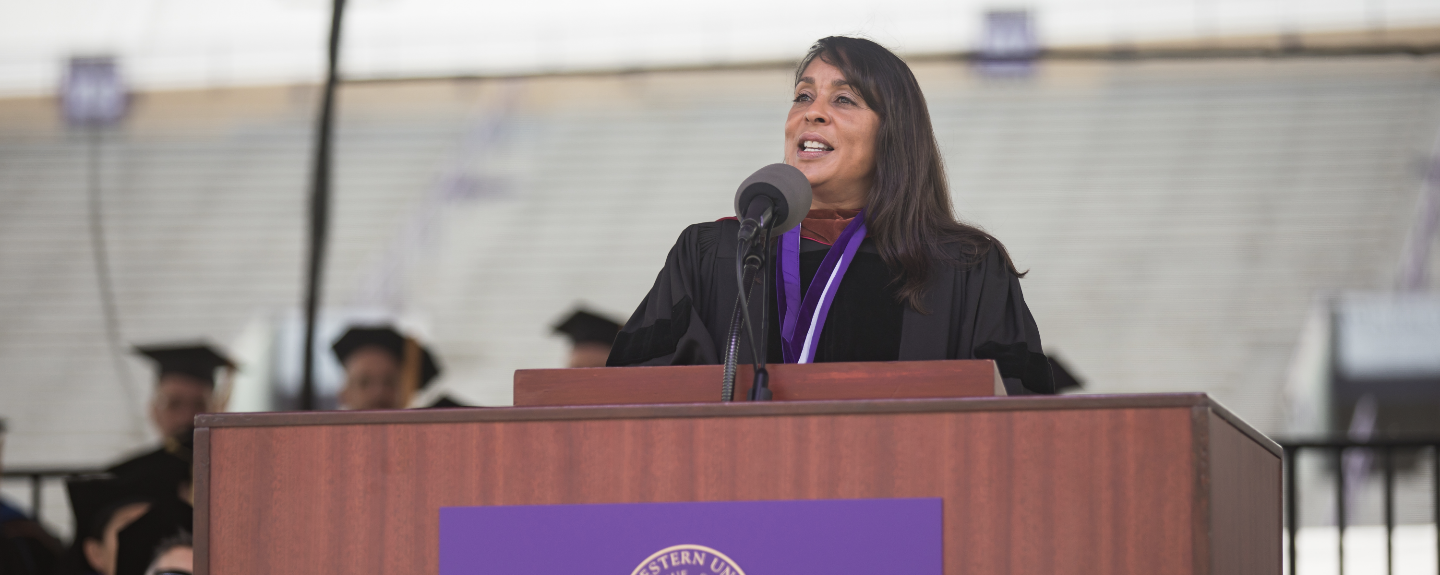
The transformative power of art
“Our own impulses toward beauty are the greatest reminders of our humanity,” poet Natasha Trethewey tells the Class of 2019
By Rebecca Lindell
In challenging times, art is essential for survival, says Natasha Trethewey, a Weinberg College professor of English and winner of the 2007 Pulitzer Prize for Poetry.
And that is true whether the suffering is on a personal or societal scale, added Trethewey, who delivered the Convocation address on June 22 to the College’s graduating Class of 2019.
“We are living in difficult times: everywhere we see images of mass shootings, refugees fleeing the devastation and violence of their homelands, police using deadly force on unarmed citizens, acts of terror both domestic and abroad, the rise of virulent, vocal, and increasingly mainstream forms of white nationalism and separatism, antisemitism, homophobia, transphobia, xenophobia, environmental degradation, uncivil discourse and outright lies,” Trethewey said.
“We need the truth of poetry, the transformative power of art — the way that our own impulses toward beauty are the greatest reminders of our humanity and the potential for the ennobling of our souls — more than ever. It is essential to our democracy.”
The sustaining power of art
It has also been essential in Trethewey’s journey, as the two-time U.S. Poet Laureate explained to nearly 1,000 Weinberg College graduates and the thousands of family and friends who gathered in Welsh-Ryan Arena to celebrate their achievements. Trethewey, who grew up with a mentally ill and violent stepfather, found refuge in the arts even before she became a poet — writing short stories and acting in plays to “imagine [herself] into other worlds” and dancing to express emotions that she could not otherwise articulate.
“Even the gravestone rubbings I did in the old cemetery near my house provided not only images I could hang on my walls—moody and beautiful in shades of charcoal—but also a way to connect with history dating back a century or more,” Trethewey said. “Already, art was proving to be transformative in my life. I could not have imagined how deeply I would come to need its healing, sustaining effects.”
Trethewey’s mother eventually left and divorced her stepfather, but he returned to murder her mother in 1985, leaving Trethewey, who was then a 19-year-old college student, with an “existential wound” that she struggled to comprehend. She discovered that poetry spoke to her at a deep, inchoate level, illuminating her emotions in unexpected ways. Poems such as “Musee de Beaux Arts” by W. H. Auden and “When I Am Asked” by Lisel Mueller and art such as “Landscape with the Fall of Icarus” by Pieter Breughel surprised Trethewey with their ability to portray the nuances of grief.
A pillar for the soul
Through art and poetry, Trethewey found not only solace, but the means to connect with others and with the world. She reminded the graduates that the healing powers of the arts would be available to them throughout their lives.
“Whatever your path, wherever this direction you’ve begun at Northwestern takes you, the arts are always there to pillar your soul, to connect you to the hearts and minds of others across time and space, to teach you about our shared history, to summon ‘the better angels of our nature’ —our capacity for empathy and hope — in the pursuit of the necessary, collective goals of justice and living our best lives,” Trethewey said.
Weinberg College Dean Adrian Randolph echoed Trethewey’s remarks, noting that her work as a scholar and poet embodies the College’s values of “creativity, judgment and community,” which are instilled through a rigorous and interdisciplinary arts and sciences education.
Back to top